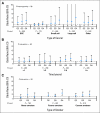C-reactive protein and risk of lung cancer
- PMID: 20421535
- PMCID: PMC2881850
- DOI: 10.1200/JCO.2009.27.0454
C-reactive protein and risk of lung cancer
Abstract
Purpose: Chronic inflammation could play a role in lung carcinogenesis, underscoring the potential for lung cancer prevention and screening. We investigated the association of circulating high-sensitivity C-reactive protein (CRP, an inflammation biomarker) and CRP single nucleotide polymorphisms (SNPs) with prospective lung cancer risk.
Patients and methods: We conducted a nested case-control study of 592 lung cancer patients and 670 controls with available prediagnostic serum and 378 patients and 447 controls with DNA within the screening arm of the Prostate, Lung, Colorectal, and Ovarian Cancer Screening Trial (N = 77,464). Controls were matched to patients on age, sex, entry year, follow-up time, and smoking. We measured CRP levels in baseline serum samples and genotyped five common CRP SNPs.
Results: Elevated CRP levels were associated with increased lung cancer risk (odds ratio [OR], 1.98; 95% CI, 1.35 to 2.89; P-trend < .001 for fourth quartile [Q4, > or = 5.6 mg/L] v Q1 [< 1.0 mg/L]). The CRP association did not differ significantly by histology, follow-up time, or smoking status, but was most apparent for squamous cell carcinomas (OR, 2.92; 95% CI, 1.30 to 6.54), 2 to 5 years before lung cancer diagnosis (OR, 2.33; 95% CI, 1.24 to 4.39), and among former smokers (OR, 2.48; 95% CI, 1.53 to 4.03) and current smokers (OR, 1.90; 95% CI, 1.06 to 3.41). Although CRP SNPs and haplotypes were associated with CRP levels, they were not associated with lung cancer risk. Ten-year standardized absolute risks of lung cancer were higher with elevated CRP levels among former smokers (Q4: 2.55%; 95% CI, 1.98% to 3.27% v Q1: 1.39%; 95% CI, 1.07% to 1.81%) and current smokers (Q4: 7.37%; 95% CI, 5.81% to 9.33% v Q1: 4.03%; 95% CI, 3.01% to 5.40%).
Conclusion: Elevated CRP levels are associated with subsequently increased lung cancer risk, suggesting an etiologic role for chronic pulmonary inflammation in lung carcinogenesis.
Conflict of interest statement
Authors' disclosures of potential conflicts of interest and author contributions are found at the end of this article.
Figures

References
-
- Alberg AJ, Brock MV, Samet JM. Epidemiology of lung cancer: Looking to the future. J Clin Oncol. 2005;23:3175–3185. - PubMed
-
- Bauer AK, Dwyer-Nield LD, Keil K, et al. Butylated hydroxytoluene (BHT) induction of pulmonary inflammation: A role in tumor promotion. Exp Lung Res. 2001;27:197–216. - PubMed
-
- Ballaz S, Mulshine JL. The potential contributions of chronic inflammation to lung carcinogenesis. Clin Lung Cancer. 2003;5:46–62. - PubMed
-
- Engels EA. Inflammation in the development of lung cancer: Epidemiological evidence. Expert Rev Anticancer Ther. 2008;8:605–615. - PubMed
-
- Santillan AA, Camargo CA, Jr, Colditz GA. A meta-analysis of asthma and risk of lung cancer (United States) Cancer Causes Control. 2003;14:327–334. - PubMed
Publication types
MeSH terms
Substances
Grants and funding
LinkOut - more resources
Full Text Sources
Other Literature Sources
Medical
Research Materials
Miscellaneous

